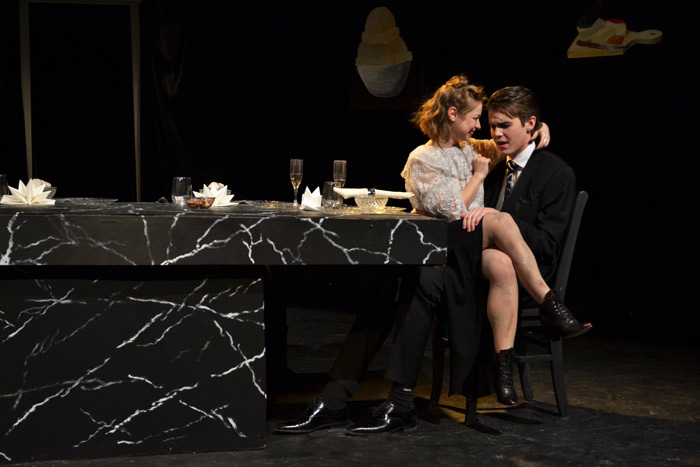The ideal audience member of Players’ Theatre production of Dinner! is someone who played with their food as a child, and sat in on philosophy lectures as a first year wondering how the hell this applies to real life.
Dinner!, written by Moira Buffini and first premiering in 2002, follows an out-of-the-ordinary dinner party of upper class London suburbanites. While the action takes place in the present, the posh accents and sharp class barriers feel as though they’ve been taken out of an episode of Downton Abbey. The dialogue features countless discussions of philosophy, the meaning of life and death, and microbes. While the lengthier discussions of philosophy can be head-spinning, the driving force is the characters and their obsession with verbally dissecting every experience, event, and conversation. While early on a philosopher declares that nothing in life has meaning, the characters spend the rest of the dinner finding meaning in everything.
The play begins with Paige (Georgia Pearson) and Lars (Alastair Pitts), a married couple awaiting the arrival of their guests for a dinner party celebrating the successful publication of Lars’ new philosophy book. The first guest is Wynne (Eleónore Lamothe), Lars’ old college friend with whom he has reconnected, much to Paige’s dismay. Wynne initially appears as the creative and passionate free spirit, who greets new acquaintances with a full kiss on the lips, paints pictures of her ex-lovers’ genitals, and couldn’t bare the thought of eating an animal, a perfect juxtaposition to the shrewish and controlling Paige. Then there is Hal (Guillaume Doussin) a dorky, but hot-tempered microbiologist with his new girlfriend Sian (Sarah Foulkes), the cold and silent journalist, who serves as the most likeable character for the first act. The upper crust-y dinner guests must change their perspectives a bit after the arrival of Mike (Victor Prive), a working class truck driver who has crashed his van nearby.
Director Sophie van Bastelaer highlights the drama and emotional chaos of the characters, which sometimes means the comedy is overshadowed. There are clear moments that are set up for dark humour, like Sian’s verbal catalogue of murder weapons, but these scenes can feel tedious when the comedy doesn’t reach it’s full potential. It’s hard for these moments not to feel like intermissions between philosophical talks. As with any play that deals with such dense subjects there is a risk of feeling like you’re sitting in on a lecture.
[metaslider id=43323]
While performances from much of the cast sometimes verge on over-acting, Pearson plays Paige with a balance of subtlety and grandeur. When presenting her culinary creations, she is the spiteful wife who greedily demands her husband’s attention as she humiliates him in front of his friends. Yet she also manages to invoke pity, and we see her character almost like a child. In the gruelling scene where Lars shares a romantic moment with Wynne while Paige watches in stoic silence, making us aware of the destruction of her spirit.
On the black box stage is a large and heavy table, designed to look like marble and set for a classy dinner party. With actors sitting on one side of the table, as well as either end, there is a sense that the audience is looking in on the last supper. In this painting Jesus and his disciples are selfish narcissists, comfortably insulated from the real world by their money. And like a passover seder, the meal is more metaphorical than nourishing or enjoyable. Paige is on a mission to prove just what Lars philosophy is worth by applying each one of his nihilistic concepts to the meal itself. The dinner starts off with a literal primordial soup in order to make the guest contemplate their evolutionary lineage, while the main course makes them choose between life or death.
Paige repeats the line, “Waiter, we need drinks,” whenever the conversation gets tense, which leads to the table slowly filling up with empty wine glasses. The wine glasses on the table act as a clock, letting the audience know both how much time has gone by, and how inebriated the guests are. So the more drunk the guests get, the more the truth comes to the forefront. The unexpected ending forces both characters and audience to stop dealing in abstract thought and face what is real, and what has been right in front of viewers the entire time.








